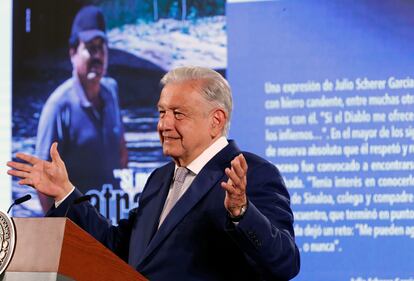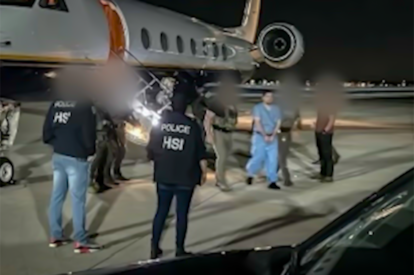Mexican president claims that El Chapo’s son agreed to turn himself over to the United States
López Obrador said that the pilot initially linked to the case did not participate in the arrest of El Mayo Zambada, and has called for an end to the speculation while the U.S. government prepares to release of the full report on what happened

Information about the arrest of Ismael “El Mayo” Zambada and Joaquín Guzmán López — the son of notorious drug trafficker Joaquín “El Chapo” Guzmán — continues to arrive in dribs and drabs. Mexican President Andrés Manuel López Obrador said on Tuesday that the most probable version of the events is that El Chapo’s son agreed to surrender with U.S. authorities. “The United States government itself has acknowledged that they carried out a negotiation, at least, with one of the two, with Joaquín Guzmán López, that is what they informed us,” said the president. “It seems that it was an agreement.” López Obrador added that the pilot initially linked to the case does not seem to have participated in the arrest. He called for an end to the speculation while the U.S. government prepares to release of the full report on what happened.
The surprise arrest of Zambada and Guzmán López — two leaders of the Sinaloa Cartel — occurred on July 25, after they landed in a small plane at the Santa Teresa airport in New Mexico. Mexican authorities requested a report from the U.S. Department of Justice, calling for information on what happened in Mexican territory, the flight plan of the aircraft and a detailed account of how the arrest occurred. “U.S. law enforcement agencies were notified on several occasions that Joaquín Guzmán López was considering surrendering to U.S. authorities; however, he had never made that intention concrete,” the Department of Justice stated two days after the arrest, in a seven-point document read by Mexican Secretary of Security Rosa Icela Rodríguez.
López Obrador has since pledged to make public the information provided by the Biden administration. Mexico has two open channels with its U.S. counterparts: one between the State Department and the Ministry of Foreign Affairs, and the other between the Department of Justice and the Attorney General’s Office, which is independent of the executive. Apart from what was presented on July 29, there has been no official report, which has fueled speculation, especially of the arrest of Zambada, who is 76 years old.
Three main hypotheses have been put forward following the arrest of El Mayo, one of the country’s most powerful crime bosses: firstly that he was kidnapped by Guzmán López, his godson, as his lawyer claims; secondly, that he was betrayed and boarded the plane after being tricked, as U.S. agencies initially leaked; and thirdly, that he turned himself in voluntarily, as a legal representative of the Guzmán family in Mexico claimed. Zambada, whose health has deteriorated, has appeared twice before a court in the border city of El Paso and pleaded not guilty to the seven charges against him in Texas. Amid the conflicting accounts, there has been talk that Washington has been secretly in contact with El Mayo and Los Chapitos, the four heirs of El Chapo, for years.

All three theories have complex implications. Mexican authorities have opted for caution, avoiding statements that could increase tensions between the main factions of the Sinaloa Cartel, and comments about the country’s distrust in the White House on issues of security: the U.S. did not report the arrest of the drug traffickers until it happened.
The arrest of El Mayo, a criminal leader with a vast network of contacts in politics, has raised the possibility that he will share information about how organized crime colludes with politicians and high-ranking officials in Mexico. López Obrador declared last week that possible denunciations by Zambada will not harm his administration. In his last press conference, he reiterated the point and asked for complete transparency. “Of course, if they are going to report on their ties with Mexican authorities, it helps to know how much support they gave to the authorities, to report who protected them, all this will help a lot, and it will also help with the agreements with U.S. agencies,” he said.
Almost two weeks after the arrest, there are few certainties about what happened, and questions continue to be raised. The pilot who was thought to have flown both drug traffickers appears to have had no involvement in the arrest: according to the latest reports, he was mistakenly implicated after a mix-up in immigration records. The plane apparently did not take off from Hermosillo, according to the governor of Sonora, Alfonso Durazo. Nothing is known about the flight plan either. The legal representatives of Zambada and El Chapo’s son in the United States deny that the two agreed to surrender, in direct contradiction to what both U.S. and Mexican authorities have claimed.
On the ground, the capture of both drug traffickers — a symbolic blow in the war on drugs — does not seem to have had an impact on the drug corridors that cross the U.S.-Mexican border. Last week, the U.S. Border Patrol announced the largest seizure of fentanyl on record. Four million pills were seized in Arizona (around 450 kilos of drugs), a route supposedly controlled by the Sinaloa Cartel. “Mr. Zambada is arrested, but if we do not address this [fentanyl] consumption and if we do not give young people options so that they don’t become hooked [on drugs] and aren’t used in drug trafficking gangs, we are not going to face the problem, we have to address the root causes,” said López Obrador. The president said he hopes to have a broader picture of what happened before the trial begins in the U.S., which could take months or even years.
Sign up for our weekly newsletter to get more English-language news coverage from EL PAÍS USA Edition
Tu suscripción se está usando en otro dispositivo
¿Quieres añadir otro usuario a tu suscripción?
Si continúas leyendo en este dispositivo, no se podrá leer en el otro.
FlechaTu suscripción se está usando en otro dispositivo y solo puedes acceder a EL PAÍS desde un dispositivo a la vez.
Si quieres compartir tu cuenta, cambia tu suscripción a la modalidad Premium, así podrás añadir otro usuario. Cada uno accederá con su propia cuenta de email, lo que os permitirá personalizar vuestra experiencia en EL PAÍS.
¿Tienes una suscripción de empresa? Accede aquí para contratar más cuentas.
En el caso de no saber quién está usando tu cuenta, te recomendamos cambiar tu contraseña aquí.
Si decides continuar compartiendo tu cuenta, este mensaje se mostrará en tu dispositivo y en el de la otra persona que está usando tu cuenta de forma indefinida, afectando a tu experiencia de lectura. Puedes consultar aquí los términos y condiciones de la suscripción digital.









































